Did you know Google makes an average of 2 updates per day, and around 500 per year? And even if you work with someone like me, who does SEO consulting professionally, you only hear about the most major ones (3-5 per year or so).
How do you keep up with all of these updates when even Matt Cutts, Google’s spokesman, occasionally misspeaks?
The truth is, you have to focus on creating a website that gives a better user experience than any other on the internet. Only one site can do that, but if you make it your goal, you’ll be fine. When you stick with the principles Google outlines, you can give yourself a 99.99% chance to stay protected from Google penalties.
Speaking of those, there are two kinds of penalties you can get:
Manual Penalty – Google notifies you in its Webmaster Tools that you have been penalized. Google has dedicated employees whose job is to manually browse websites and their SEO metrics, and see if they are deserving of a penalty or not.
Algorithmic Penalty – With each Google update, and especially the major ones like Hummingbird, Panda, and Penguin, there’s a chance that you’ll get penalized if Google doesn’t like what you’re doing. For example, they recently dropped the hammer on guest blogging as an SEO tactic.
You can still do it if you post only on high-quality blogs and use it to primarily focus on building authority (not links). But if you own a website with the majority of its links from low-quality guest blogs, you have a good chance of getting whacked with a Google penalty.
What in Specific Do You Do to Stay Protected from Google Updates?
This works in 2014:
Good Video to Watch about what Google wants…
On-Site SEO
This is what you should do on your own website:
Build interesting, specific, and actionable content – This one will always go for as long as Google exists. It wants regularly updated content. And it has to be your very best writing. It also looks at factors like bounce rate (the number of people who visit your website’s pages once and leave) and number of social shares to determine the value of your content.
Optimization – Every page on your website should be optimized for 1-4 keywords. This will always remain valid, even in the Google environment that exists years from now.
When you think about it, Google’s always going to need a way to identify how to rank your website, and what terms to rank it for. People will always type search terms into Google.
What changes is Google’s ability to identify what your site is about and rank it for the appropriate terms. For you, the key is making the keywords sound natural within your site’s copy.
Navigation – Your site should be laid out so it’s simple and easy to use. Use 2-3 calls-to-action on your home page and services pages.
Design – You don’t need anything fancy, but your site should look professional, modern, and above all, load fast. One of the biggest mistakes for SMBs and corporations alike is many do not have a modern-looking website.
If you have unique branding (logo and colors), that’s a plus for your visitors, but Google doesn’t require that.
Natural link use – Google frowns on anchor texts that match your keywords exactly, and this goes for links both on your site and off of it. It’s fine to link wherever you think it helps your visitors most, but you can’t optimize their anchor texts. Use anchor texts like “click here” and “learn more.” And Google also doesn’t like keywords stuffed in links in the footer of your website.
Off-Site SEO
The main thing with off-site SEO is links. They are still the biggest factor in your search rankings by far. There is some evidence that getting social shares increases your rankings, but that still gets debated hotly.
Links are guaranteed to continue to have a major impact on your search rankings though, so let’s talk about how to get them safely in 2014 and beyond:
Links have to be natural, not built – A “built” link is one that you put specifically on a website, without any real oversight by that site’s owner. Google does not want these links pointing to your site at all. In reality, you can probably use them as a small part (5%) of your overall link profile. But, they’re not worth your effort. Built links include ones you get from forums, and low-quality article and business directories.
“Natural links” mean the site’s owner reviewed your request thoroughly, and willingly placed your link on their site. Even though guest blog post links have been attacked by Google, you can still use these as part of an overall link strategy. If you approach your chamber of commerce, a local business association, or the BBB, those would be high-quality guest post links.
Links should be on reputable sites only – If the website you’re looking at appears cluttered, outdated, or otherwise uncared for, generally that site is not a reputable one to try to earn a link from. If it looks like the owner of the site actively cares for it, it’s usually a good place to have your link.
5-10 years ago, you could place your link on any old website, and Google would give you at least some value for it. But, Google’s only going to get tighter on this in the future.
The website should be topically related to yours – If you run an HVAC company, your links should come from DIY websites and reputable business directories. If you have a small percentage of links (5% or so) coming from sites completely unrelated to yours, that’s nothing to worry about.
However, if you have 25% of your links coming from sites about cooking and mobile technology, then you have reason to be concerned about a Google penalty.
You should have diverse anchor text – Now, SEOs have many varying opinions on this. There’s no specific rule that Google has made anyone aware of, but Google has stated it does not want a high percentage of your links to have anchor text that exactly matches your target keywords.
Ratios for your anchor texts something like this will keep you safe:
50% – Variations of your brand name (some say 70%).
20% – Your homepage’s URL.
20% – Variations of terms entirely unrelated to your keywords like “learn more” or “click here”.
5% – Slight variations of your target keywords.
5% – Exact match of your target keywords.
If you follow those general guidelines, you’ll avoid a Google penalty now and for years into the future.






